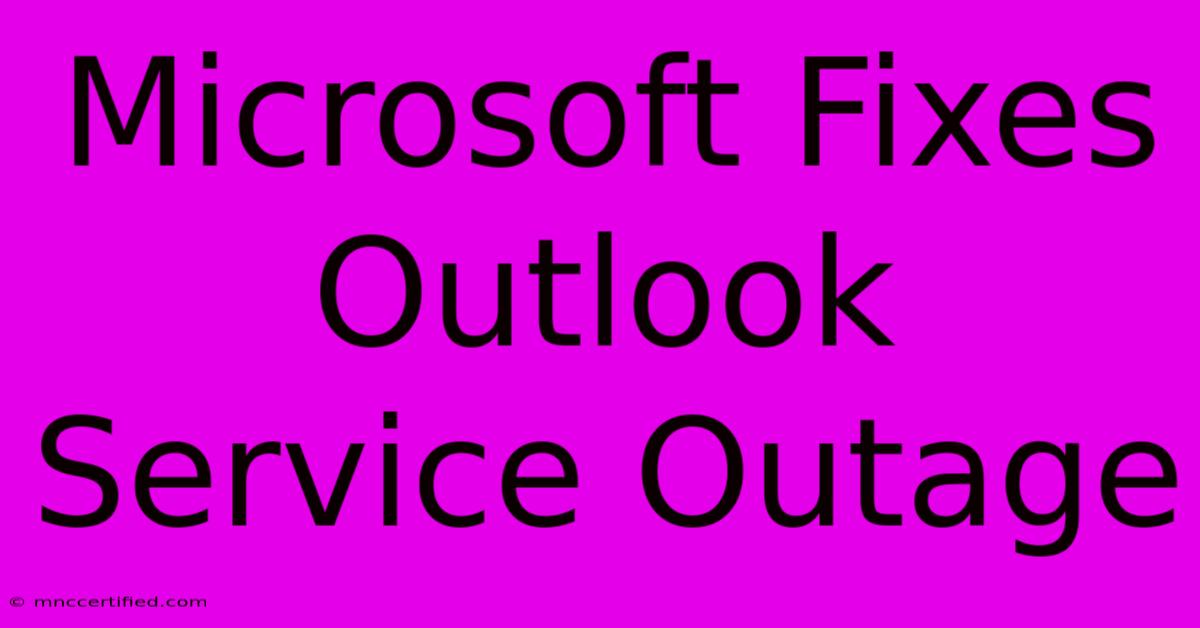Microsoft Fixes Outlook Service Outage

Table of Contents
Microsoft Fixes Outlook Service Outage: What Happened and How to Avoid Future Issues
Microsoft recently experienced an Outlook service outage, impacting millions of users globally. This widespread disruption highlighted the crucial role email plays in both personal and professional lives and underscored the importance of understanding potential service interruptions. This article details the outage, its impact, and steps users can take to mitigate future disruptions.
Understanding the Outlook Service Outage
The recent Outlook outage caused significant inconvenience for countless individuals and businesses. Users reported difficulties accessing email, calendars, and contacts. While Microsoft was swift to address the problem, the disruption served as a stark reminder of the potential vulnerability of relying on a single service provider for critical communication needs. Microsoft's official statement acknowledged the issue and confirmed their engineers worked diligently to restore full functionality. While the precise cause wasn't immediately disclosed, the swift resolution suggests a temporary technical glitch rather than a prolonged system failure.
Impact of the Outage
The impact of the Outlook outage rippled across various sectors. Businesses experienced delays in communication, affecting productivity and potentially impacting client relationships. Individuals faced difficulties in managing their personal emails, appointments, and contact information. The outage underscored the interconnectedness of modern communication and the significant consequences when such systems fail.
Key Impacts:
- Lost Productivity: Businesses faced significant productivity losses due to email inaccessibility.
- Communication Breakdown: Missed deadlines and delayed responses impacted both internal and external communication.
- Frustration and Disruption: Users experienced frustration and disruption to their daily routines.
- Reputational Risk: For businesses, the outage could have negatively affected their reputation.
Preventing Future Disruptions: Best Practices
While relying solely on a single email provider carries inherent risks, users can take proactive steps to minimize the impact of future outages.
Diversify Your Communication Channels
Don't put all your eggs in one basket. Consider using multiple communication methods, such as instant messaging platforms (Slack, Teams), alternative email providers (Gmail, Yahoo), and even traditional phone calls for critical communication. This diversification reduces dependence on a single service and offers a backup plan during outages.
Utilize Offline Access Features
Many email clients offer offline access features. Enable this functionality to access emails, calendars, and contacts even when you're offline or the service provider experiences an outage. This allows you to continue working even if the Outlook service is unavailable.
Regularly Backup Your Data
Regular data backups are crucial. This ensures you can recover your emails, contacts, and calendar information in case of data loss, either due to a service outage or other technical issues. Utilize cloud storage or external hard drives to maintain regular backups.
Stay Informed About Service Status
Monitor Microsoft's official service status page regularly. This page provides updates on any ongoing outages or planned maintenance. Subscribing to email alerts can provide real-time notifications about service disruptions.
Explore Alternative Email Clients
Exploring alternative email clients, such as Thunderbird or Apple Mail, can offer additional flexibility and reduce dependence on a single platform. These clients can often connect to multiple email accounts, providing a robust backup solution.
Conclusion: Preparing for the Inevitable
While technology strives for seamless operation, service interruptions are inevitable. By diversifying communication methods, utilizing offline access, regularly backing up data, staying informed, and exploring alternative email clients, users can mitigate the impact of future Outlook service outages and ensure business continuity. The recent outage served as a valuable lesson, highlighting the importance of preparedness in today's digitally reliant world.

Thank you for visiting our website wich cover about Microsoft Fixes Outlook Service Outage. We hope the information provided has been useful to you. Feel free to contact us if you have any questions or need further assistance. See you next time and dont miss to bookmark.
Featured Posts
-
Shelter Insurance Charleston Ar
Nov 26, 2024
-
Bodie Essentials Of Investments
Nov 26, 2024
-
Geldof Marks 40 Years Of Band Aid
Nov 26, 2024
-
Barry Bonds Topps Stadium Club
Nov 26, 2024
-
Hallmark Specialty Insurance Co
Nov 26, 2024